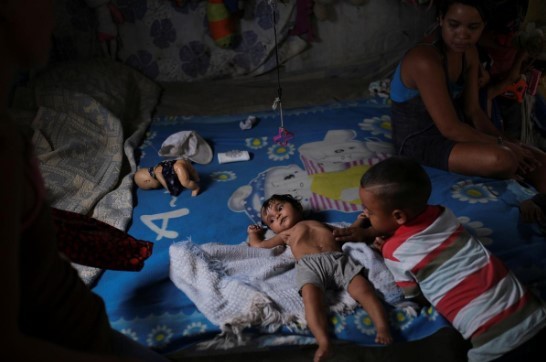UN Study Says 1 in 3 Venezuelans Fighting with Hunger

A study published by the UN World Food Program on Sunday found one in every three people in Venezuela is struggling with hunger on a daily basis.
The study reports one out of three Venezuelan is struggling to put enough food on the table, barely meeting the minimum nutrition requirements as the nation's severe economic contraction and political upheaval persist.
A nationwide survey was conducted. Data based on 8,375 questionnaires revealed a startlingly large number of Venezuelans surviving off a diet consisting mostly of tubers and beans as salaries are rendered useless due to hyperinflation.
The World Food Program's study, which was conducted at the invitation of the country's government, shows roughly a third of the population, or 9.3 million people, are severely food insecure. Food insecurity pertains to an individual being unable to meet basic dietary needs.
Food insecurity is a nationwide concern, the study says. Certain states like Delta Amacuro, Amazonas, and Falcon were found to have especially high levels of food insecurity.
The study also showed one in every five people living in more prosperous regions are estimated to be food insecure.
Nearly 74% of families are found adopting "food-related coping strategies" such as reducing the variety and quality of food they eat, the survey said.
It is also reported that an estimated 60% of households cut their meals' portion sizes. While 33% said they trade labor for food and 20% reported selling family assets to cover basic needs.
The report states the issue to be more about the difficulty of obtaining food than availability. High prices are said to be the cause of the difficulty. An estimated 37% reported Venezuela's severe economic contraction caused them to lose their jobs.
Access to electricity and water was also a subject of the study conducted by the World Food Program. Findings indicate four in every 10 households experience daily power cuts and water service.
"The reality of this report shows the gravity of the social, economic and political crisis in our country," Venezuelan opposition leader Miguel Pizarro said.
Venezuelan rights advocate Carolina Fernandez said she believes the situation has deteriorated even more after the study, which was done from July through September, was conducted.
"Now it's not enough to have one person living abroad," she said, pertaining to the hardship of surviving off remittances by relatives abroad.
Fernandes also said food insecurity will have an impact on a generation of Venezuelan youth going hungry during formative years.
The World Food Program said it was granted "full independence" and collected data throughout the country "without any impediment or obstruction" despite Venezuelan President Nicolas Maduro's years of reluctance to invite international organizations to provide assessments of the nation's humanitarian ordeal.
The agency said it was looking forward to a continuation of its dialogue with the country's government. It also said it will focus on providing assistant for those who are deemed food insecure.
Over recent years, the political and humanitarian crisis in Venezuela has led to over 4.5 million people fleeing the country.
President Maduro still managed to keep his power despite a push by the leader of the opposition and mounting US sanctions.
Maduro's government urged the International Criminal Court to open an investigation on the financial sanctions, saying it is causing the country suffering and death.
The nation's struggles to feed citizens and provide adequate medical care predate the US sanctions.
Subscribe to Latin Post!
Sign up for our free newsletter for the Latest coverage!
© 2025 Latin Post. All rights reserved. Do not reproduce without permission.















